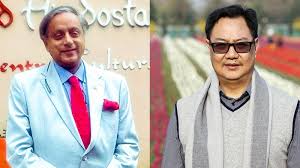‘Political desperation’: Union Minister Rijiju backs Tharoor amid Cong’s ‘super spokesperson’ jibe

In a fresh wave of political rhetoric that highlights the increasing intensity of India’s political battlefront, Union Minister Kiren Rijiju has come out in strong support of Congress leader Shashi Tharoor while responding sharply to the Congress party’s recent sarcastic reference to him as the Bharatiya Janata Party’s (BJP) ‘super spokesperson.’ The minister’s remarks accusing Congress of “political desperation” have added another layer to the ongoing tussle between the two major parties as they gear up for the next general elections.
Congress’s ‘Super Spokesperson’ Jibe
The Congress party, in an attempt to undermine Rijiju’s influence in national media and political discourse, had mockingly labeled him the BJP’s ‘super spokesperson.’ This jibe was intended to criticize what Congress sees as an over-dependence on a few vocal leaders to carry the BJP’s narrative. Party sources implied that this ‘super spokesperson’ tag was a sarcastic way to dismiss Rijiju’s active presence in media debates and public forums.
This latest exchange between the two parties is emblematic of the heightened tensions in India’s political arena, where communication strategies and media presence have become crucial elements of electoral success. The Congress’s taunt, while aimed at discrediting Rijiju, inadvertently underscored his growing visibility and significance within the BJP.
Rijiju’s Firm Response: Political Desperation
Union Minister Kiren Rijiju responded promptly and decisively to the Congress’s jibe. At a recent press interaction, he described the ‘super spokesperson’ comment as a “clear sign of political desperation.” Rijiju argued that resorting to personal attacks and sarcastic labels reflects Congress’s anxiety and diminishing ground in the current political landscape.
“Whenever a political opponent feels threatened, they resort to cheap name-calling instead of addressing real issues,” Rijiju said. “The Congress’s attempt to belittle me shows their nervousness about the BJP’s growing reach and effectiveness in communicating our government’s achievements.”
Rijiju also highlighted that such political rhetoric is common in competitive democracies but warned that voters are increasingly becoming aware of these tactics. “The people want to hear about development and governance, not petty political mudslinging,” he emphasized.
Backing Shashi Tharoor: Respect Beyond Party Lines
Interestingly, Rijiju also expressed admiration for Shashi Tharoor, one of Congress’s most articulate and intellectual leaders. He noted that despite political differences, Tharoor’s role as a senior Congress leader and a prominent parliamentarian commands respect across party lines.
“Shashi Tharoor is a leader who brings intellect and substance to political debates,” Rijiju remarked. “I may oppose him politically, but I acknowledge his contributions to shaping meaningful discussions in Parliament and beyond.”
This public backing of Tharoor by a senior BJP leader stands out, as it reflects a more nuanced approach amid the usual adversarial tone of Indian politics. It also serves to underline that political competition does not necessarily preclude mutual respect among leaders.
Congress’s Perspective: Over-Reliance on Spokespersons
From the Congress camp, the narrative remains critical of the BJP’s communication style. Party insiders argue that the BJP’s reliance on a small group of dynamic spokespersons, including Rijiju, reflects a lack of grassroots connect and deeper policy engagement.
“We call it the ‘super spokesperson’ tag to highlight that the BJP prefers loud voices over genuine engagement with public concerns,” said a senior Congress official. “It’s easier for them to dominate media cycles with rhetoric rather than addressing systemic problems.”
The Congress party’s stance is also seen as a strategic move to question the BJP’s governance record while trying to mobilize its cadre and supporters around issues that go beyond media battles.
Political Analysts Weigh In
Political experts view this exchange as part of the broader contest for narrative control as the next general elections approach. Media presence and effective communication are increasingly seen as key battlegrounds, alongside policy initiatives and on-ground campaigning.
Dr. Anil Kumar, a political analyst based in Delhi, said, “Both BJP and Congress recognize that influencing public perception through spokespersons and media debates can be as impactful as manifestos and policy announcements. The ‘super spokesperson’ remark and Rijiju’s rebuttal reflect this evolving political strategy.”
He added that such exchanges might intensify in coming months, with each party trying to assert dominance in the news cycle and social media platforms.
The Larger Picture: Communication in Indian Politics
The tussle between Union Minister Rijiju and Congress over the ‘super spokesperson’ label underscores the crucial role of communication in contemporary Indian politics. Leaders who can command media attention and articulate party positions effectively often shape public opinion significantly.
In the BJP, Rijiju has emerged as a prominent voice who is regularly seen debating in television studios, addressing public grievances, and defending government policies. His visibility makes him a natural target for opposition parties looking to disrupt the BJP’s narrative control.
On the other hand, the Congress’s attempt to mock this prominence is part of a larger effort to regain lost ground by challenging the BJP’s communication dominance. However, critics argue that such tactics risk alienating voters who seek substantive discussions over political point-scoring.
Conclusion
The recent verbal exchange between Union Minister Kiren Rijiju and the Congress party over the ‘super spokesperson’ jibe encapsulates the evolving dynamics of India’s political communication. Rijiju’s defense of Shashi Tharoor and his characterization of Congress’s remarks as ‘political desperation’ highlight the growing importance of media strategy in electoral politics.
As India moves closer to the next general elections, political parties are likely to continue their aggressive focus on spokesperson roles and public messaging. Voters, meanwhile, will be watching closely to see which leaders can balance rhetoric with real solutions to the country’s challenges.






